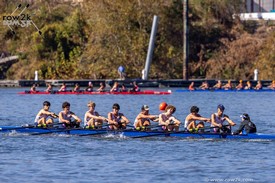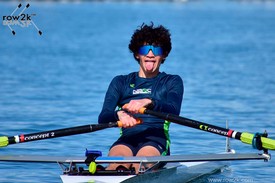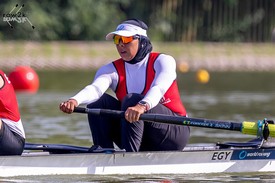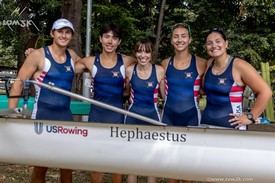A Cox Out of Water
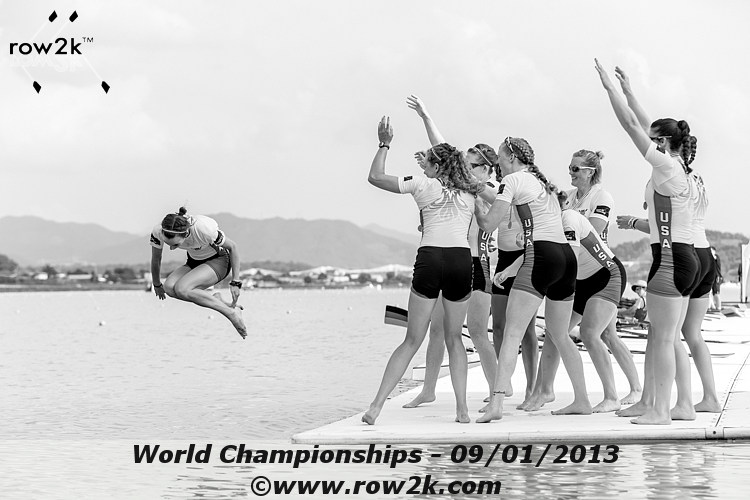
As part of our series on how coxswains survive winter training, we went down to Chula Vista, CA to chat with Katelin Snyder, coxswain for the US Women's National Team. Snyder drove the US Women's 8+ to a World's Best Time at World Cup III in Lucerne last July before taking her boat on to win the World Championship in Chungju, Korea. Snyder shared with us some of the lessons she has learned from her first days as a coxswain to her long winters on land at the Chula Vista Olympic Training Center. Check out Katelin in our video interview, or read the transcript below.
Could you tell us a bit about coxing background?
My name is Katelin Snyder and I am a coxswain on the U.S. Women’s National Team. I started coxing for Winter Park High School in 2002 and then I went to the University of Washington and graduated in 2009.
What was your first experience like coxing in the winter?
When I was coxing at Winter Park High School we were on the water all year round because we were in Florida. The only thing I really had to worry about as a coxswain was putting on more clothes and in Winter Park, Florida that’s not really a big problem because it doesn’t even get that cold.
Even at the high school level things are always more boring in the winter. We’re doing more steady state and we’re doing more technique and we’re trying to build our base fitness. Even when you’re on the water in the winter it’s usually pretty boring stuff. You’ve got to work hard to stay engaged when things are just long and low.
Did location and weather influence your college decision after living in Florida?
I wasn’t really worried about being on the water year round in college because I didn’t really know that being off the water would be anything different than being on the water because we didn’t spend that much time on land. When we were on land in high school I was pretty engaged with keeping track of the erg scores and we did a lot of cheering so that was really fun. I would participate in workouts if they were running or weightlifting so I wasn’t too worried about that in my college decision.
What was winter training like at the University of Washington?
When I got to school in Seattle I quickly learned that things are a lot colder when you’re up north. That was hard for me, I had to just kind of learn about being on the water in cold weather and making sure that I was dressed so that I could still do my job even when it was freezing. Once I figured that stuff out it was a lot of the same thing, at least when we were on the water. It’s the same thing we did in high school where you’re just trying to learn how to row, you’re doing a lot of really boring stuff, long stuff, there aren’t a lot of pieces so it’s not very exciting.
In college we did spend a lot more time on land, either because it was cold or because of NCAA regulations or just because we needed to get familiar with the erg. I was pretty bored my freshman year, for sure, because I didn’t really know what to do with myself when everyone else was erging for the whole practice or for half the practice, especially in the weight room; we weren’t allowed to have coxswains in the weight room because it was small and we would just kind of get in the way. No one would tell me what to do so I kind of had to find things to do. You can only rearrange the cox boxes so many times. I started working out more just on my own. We have some treadmills and stair masters that are kind of above the weight room at U Dub so that was nice because I could still be with the team but also be working out and doing my own thing and not kind of getting in the way of their weight lifting. I started to do a lot more of typing up scores and recording things, just trying to make myself useful and/or kind of out of the way.
That was kind of my year to just say what the heck is going on and kind of try to get my bearings on my own. There were two other coxswains on the team with me and we all kind of stuck together and tried to figure it out as one because at least that way if you’re doing the wrong thing you’re not doing the wrong thing alone, you’re with a group.
How was training different on the National Team?
When I came to the National team I was on the team in the summer of 2009 and when I came in the summer we were rowing the eight every day almost. It was kind of the same thing, like I was just getting my bearings straight, really trying to figure out who is who and make the team. I had a really short window of time to make the team so I was very focused on my coxing and kind of just figuring out where I was at and what was going on. Then when I came back to the team after the World Championships in 2009 I learned pretty quickly that National Team doesn’t row the eight that often, especially in the fall and the winter and the spring.
When I came back that fall I really had to kind of check myself and decide how am I going to stay engaged and stay present when I don’t get to go in the water a lot. That was interesting. It was hard at first because I wasn’t really used to riding in the launch and watching rowing. I would try to watch and a lot of times I wouldn’t really understand what the coaches were talking about so it made it kind of boring because I didn’t really know what to look for. We did a lot of land workouts. Sometimes I would work out with the girls and sometimes I would record scores, but there just wasn’t a lot of talking. It was a lot of steady state so I had to learn to kind of sharpen my eye so that I could learn what to watch for and how to be engaged.
Do you benefit from watching coxing from a different perspective?
It’s definitely I think made me so much better. Learning how to watch rowing in a coaching boat, or learning how to watch rowing on the erg or on video, it obviously doesn’t improve your boat feel but it really helped improve my knowledge of the sport and that’s been really helpful when I’m in the boat to try and kind of help my teammates get on the same page. The more that I know about rowing the more that I can speak clearly and concisely and try to get everyone together on the same page.
How does your team benefit from your presence even when you are not coxing?
On the U.S. Women’s team it’s important for me to be around in the winter because I really get to know the athletes and I get to know them as people and I also get to know them as athletes. If I’m watching them and I’m interacting with them then I can kind of learn where they struggle, physically and in terms of their physiology. I can kind of learn what each person needs to work on whether it’s something in the weight room or it’s a cardio base. There’s a whole slew of things. That’s going to be really helpful for me when I get into the boat because I know what’s hard for people. On the same token I can learn what is motivating to people, when there are girls that respond really well to something I can remember that and say ok, next time I’m in the boat or next time they’re struggling, not only am I going to know they’re struggling but I’m going to maybe have an idea of what to do or say to help them get through it. Then technically I think that’s the biggest thing.
If I’m watching them row and every day I’m seeing them improve or seeing them try to make changes or struggle with a change, then when I get in the boat it’s not even about what am I seeing or what am I feeling. It’s just, I know these girls and I know technically what they’re good at and what they need help with and then that makes me able to help them that much more.
What advice would you give a new coxswain in their first season of winter training?
It was really hard for me the first months, years that I had to watch steady state on the erg or watch pairs on the water. I think the advice I would give to a new coxswain is to really learn how to watch rowing in a way that they don’t need a coach or a rower to tell them what’s going on, they can just kind of look and have ideas for themselves. I think that whether you’re right or you’re wrong about what you see, at least you can start to have a greater understanding of the sport it makes it a lot more fun when you know how to watch rowing and it helps you provide more valuable input when you do get on the water.
Any other tips or tricks?
One thing that’s really helped me is that I’ve started keeping a notebook. I write down what the workout is and I also write down any of my observations for practice. I write down what I thought I did well on and where I thought that I could improve that day. That’s been really helpful because time goes by really quickly even though it seems like in the moment it’s going by really slowly. In no time at all we’ll be in the spring or the summer and we’ll be racing and for me to kind of be able to go back and look and see, what did I do in the fall and what did I actually observe and where did I struggle? That’s been really nice and that’s been helpful. In the fall when I’m not on the water every day I have more time to kind of focus on that kind of stuff. Getting that taken care of for me that’s kind of my “building the base”. Their boring steady state is their building the base and for me it’s just trying to learn more about them and about the sport so that when I do get on the water my foundation is already kind of taken care of.
When do you get back on the water?
Weather will probably decide when we get back on the water. I don’t really know when we’ll start to row the eight but I guess my goal is to make sure that I’m ready to row it every day, so I’m doing everything that I need to do so that I’m prepared to hop in at any time.
If you enjoy and rely on row2k, we need your help to be able to keep doing all this. Though row2k sometimes looks like a big, outside-funded operation, it mainly runs on enthusiasm and grit. Help us keep it coming, thank you! Learn more.
- Bont Rowing
- Calm Waters Rowing
- Concept 2
- Craftsbury Sculling
- The Crew Classic
- CrewLAB
- Croker
- Durham Boat Co.
- Empacher
- Faster Masters
- Filippi
- Fluidesign
- h2row.net
- HUDSON
- Live2Row Studios
- Nielsen-Kellerman
- Oak Ridge RA
- Peinert Boat Works
- Pocock Racing Shells
- Race1 USA
- RowKraft
- Rubini Jewelers
- Vespoli USA
- WinTech Racing
- Bont Rowing
- Calm Waters Rowing
- Concept 2
- Craftsbury Sculling
- The Crew Classic
- CrewLAB
- Croker
- Durham Boat Co.
- Empacher
- Faster Masters
- Filippi
- Fluidesign
- h2row.net
- HUDSON
- Live2Row Studios
- Nielsen-Kellerman
- Oak Ridge RA
- Peinert Boat Works
- Pocock Racing Shells
- Race1 USA
- RowKraft
- Rubini Jewelers
- Vespoli USA
- WinTech Racing







